The Life of Sant Kabir Das
It was sometime in mid 15th century that the poet-saint Kabir Das was born in Kashi (Varanasi, Uttar Pradesh). The details about the life of Kabir are shrouded in uncertainty. There are differing opinions, contrasting facts and multiple legends about his life. Even sources discussing his life are scanty. Earliest sources include the Bijak and Adi Granth. Others are Nabhaji by Bhakta Mal, Dabistan-i-Tawarikh by Mohsin Fani and Khajinat al-Asafiya.
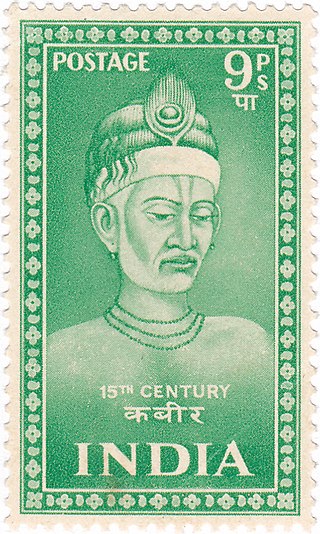
Indian postage stamp with a picture of Saint Kabir, 1952.
Source: Wikimedia Commons
It is said that Kabir was conceived miraculously. His mother was a devout Brahmin widow who had accompanied her father on a pilgrimage to a famous ascetic. Impressed by their dedication, the ascetic blessed her and told her she would soon bear a son. After the son was born, to escape dishonor (as she was not married), Kabir’s mother abandoned him. Young Kabir was adopted by Nima, the wife of a Muslim weaver. In another version of the legend, the ascetic assured the mother that the birth would be in an unusual manner and so it was, Kabir was born out of the palm of his mother! In this version of the story too, he was later adopted by the same Nima.
When people started doubting and questioning Nima about the child, the newly born miraculously proclaimed in a firm voice, “I was not born of a woman but manifested as a boy...I have neither bones, nor blood, nor skin. I reveal to men the Shabda (Word). I am the highest being...”
One can see similarities between the story of Kabir and biblical legends. Questioning the veracity of these legends would be a futile task. We would need to explore the idea of legends itself. Fantasies and myths are not characteristic of ordinary life. The fate of the ordinary man is oblivion. Flowery legends and supernatural acts are associated with extraordinary lives. Even if Kabir’s was not a virgin birth, these legends reveal that he was an extraordinary human being and hence an important person.
By the standard of the times he was living in, ‘Kabir’ was an unusual name. It is said he was named by a Qazi who opened the Qur’an several times to find a suitable name for the child and each time ended up on Kabir, meaning ‘Great,’ used for none other than the God, Allah Himself.
Kabira tu hi kabiru tu tore naam Kabir
Ram ratan tab paiye jad pahile tajahi sarir
Thou art great, you are the same, your name is Kabir
The jewel Ram is found only when bodily attachment is renounced.
In his poems, Kabir calls himself a julaha and kori. Both mean weaver, belonging to a lower caste. He did not associate himself completely with either Hindus or Muslims.
Jogi gorakh gorakh karai, Hind ram na uccharai
Musalman kahe ek khudai, kabira ko swami ghat ghat rahiyo samai.
Kabir did not undertake any formal education. He was not even trained as a weaver. While his poems abound with weaving metaphors, his heart was not fully into this profession. He was on a spiritual journey to seek the Truth which is clearly manifested in his poetry.
Tanana bunana Sabhu tajyo hai Kabir
Hari ka naam likhi liyo sarir
Kabir has renounced all spinning and weaving
The name of Hari is imprinted all over his body.
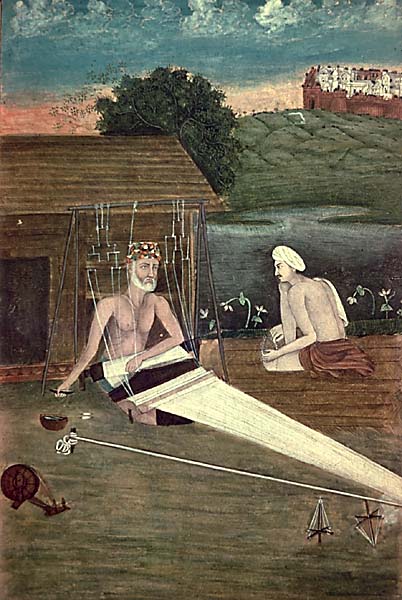
A painting from 1825 depicts Kabir weaving.
Source: Wikimedia Commons
To satiate his spiritual quest, he wanted to become the chela (disciple) of Ramananda, a famed saint in Varanasi. Kabir felt that if he could somehow know the secret mantra of his teacher, his initiation would follow. Saint Ramananda used to visit a certain ghat regularly in Varanasi. When Kabir saw him approaching, he lay down on the stairs of the ghat and was struck by Ramananda who out of shock gasped the word ‘Ram.’ Kabir found the mantra and he was later accepted as a disciple by the saint.
From Khajinat al-Asafiya, we find that a Sufi pir, Shaikh Taqqi was also the teacher of Kabir. Sufi influence is also quite apparent in Kabir’s teaching and philosophy.
There is a locality named Kabir Chaura in Varanasi which is believed to be the place where he grew up.
Kabir eventually married a woman named Loi and had two children, a son, Kamal and a daughter Kamali. Some sources suggest that he married twice or he did not marry at all. While we do not have the luxury of establishing these facts about his life, we do have insights into the philosophy propagated by him through his poems.
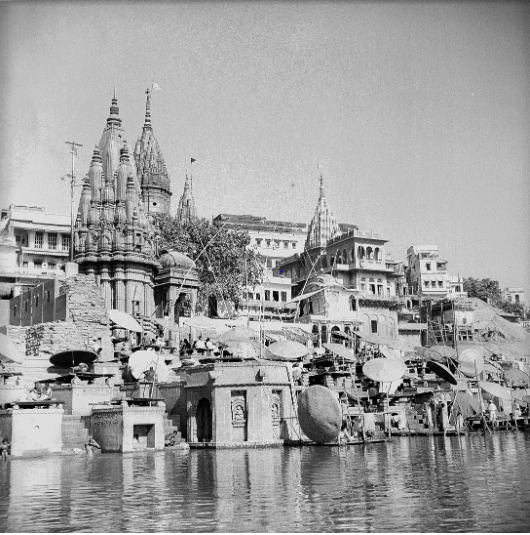
Dashashwamedh Ghat, the main Ghat of Varanasi. Kabir Must have been here.
Source: Archaeological Survey of India
Kabir was deeply concerned with the spiritual. In the Dabistan of Mohsin Fani and Ain-i-Akbari of Abul Fazl, he is mentioned as a muwahid or believer in one God. Prof. Hazari Prasad Dwived in the foreword of the book, ‘Kabir,’ by Prabhakr Machwe informed that Kabir was a devotee of Ram but not as an incarnation of Vishnu. For him, Ram is beyond any personal form or attributes. Kabir’s ultimate goal was one absolute God who is formless, without attributes, who is beyond time and space, beyond causation. Kabir’s God is knowledge, bliss. His God is the Shabda or the Word.
Jake munh matha nahin
Nahin rupak rap
Phup vas te patla
Aisa tat anup.
Who is without face or head or symbolic form, subtler than the flower’s fragrance, such an essence is He.
Kabir seems to be deeply influenced by Upanishadic non-dualism and Islamic monism. He was also guided by the Vaishnava Bhakti tradition which stressed on complete surrender towards God.
He did not acknowledge distinctions based on caste. A story goes that one day while some Brahmin men were taking a dip in the holy water of Ganga to expiate their sins, Kabir filled his wooden cup with its water and offered it to the men to drink. The men were quite offended at being offered water from a lower caste man to which he replied, “If the Ganges water cannot purify my cup, how can I believe that it can wash away my sins.”
Not just caste, Kabir spoke against idol worship and criticised both Hindus and Muslims for their rites, rituals and customs which he thought were futile. God can be achieved only through complete devotion, he preached.
Log aise bavare, pahan pujan jai
Ghar ki chakiya kahe na puje jehi ka peesa khai
People are such fools that they go to worship the stones
Why don’t they worship the stone which grinds for them the flour to eat.
All these ideas emerge in his poetry. One cannot separate his spiritual experience and his poems. In fact, he was not a conscious poet. It is his spiritual quest, his ecstasy and agony which he conveyed in his poems. Kabir is an unusual poet by all means. In the 15th century, when Persian and Sanskrit were predominant North Indian languages, he chose to write in colloquial, regional language. Not just one, his poetry is a mixture of Hindi, Khari boli, Punjabi, Bhojpuri, Urdu, Persian and Marwari.
Even though details about Kabir’s life are scanty, his verses have survived. He is a man known for, and by his poems. An ordinary man whose poems have survived over centuries is a testimony to the greatness of his poetry. Even though orally transmitted, Kabir’s poetry is known till today because of its simple language and the depth of spiritual thought and experience it is imbibed with. Many years later after his death, his poems were committed to writing. He wrote two lined doha (couplet) and longer pads (songs) which were set to music. Kabir’s poems are written in a simple language yet they are difficult to interpret as they are interspersed with complicated symbolism. We find no commitment to any standardised form or metre in his poems.
Maati kahe kumhar se tu kyun raunde mohe
Ek din aisa aayega main raundungi tohe
Clay says to the potter, why do you stamp on me
One day will come when I will trample you (after death)
Kabir’s teachings influenced many individuals and groups spiritually. Guru Nanak ji, Dadu of Ahmedabad who founded the Dadu Panth, Jiwan Das of Awadh who started the Satnami sect are some of those who quote Kabir Das in their spiritual guidance. The largest group of followers are the people of Kabir Panth (‘the Path of Kabir’) who consider him a guru guiding them towards salvation. Kabir Panth is not a separate religion but a spiritual philosophy.
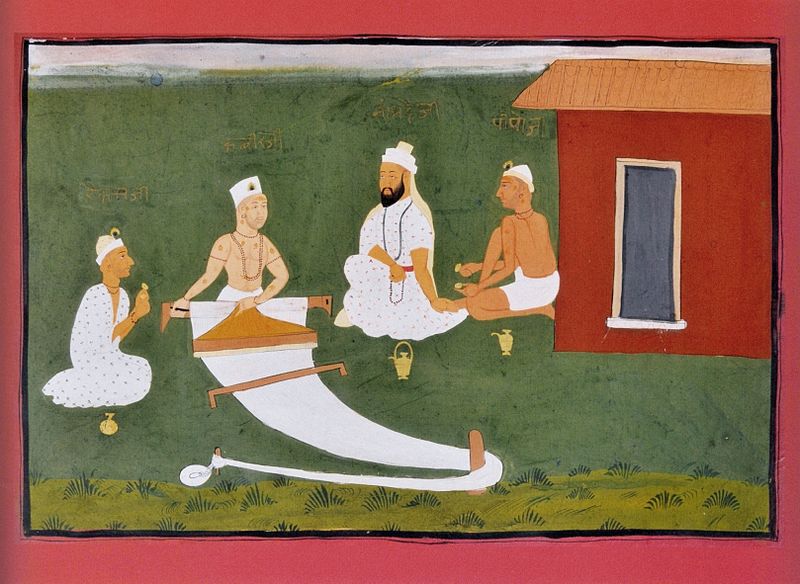
Saint Kabir with Namdev, Raidas and Pipaji, Jaipur, 19th century.
Source: Wikimedia Commons
Kabir had travelled widely in his life. He lived a long life. Sources reveal that his body had become so infirm that he could no longer play music in praise of Ram. During the last moments of his life, he had gone to the city of Maghar (Uttar Pradesh). As per a legend, after his death, there arose a conflict between Hindus who wanted to cremate his body and Muslims who wanted to bury it. In a moment of miracle, flowers appeared beneath his shroud, half of which were cremated at Kashi and half buried at Maghar. Certainly, Kabir Das died in Maghar where his grave is located.
Benares has been left by me and my intellect has become little
My whole life lost in Shivpuri, at the time of death I have arisen and come to Maghar.
O my King, I am a Bairagi and Yogi.
when dying, I am not grieved, nor separated from Thee.
The mind and breath are made the drinking gourd, the fiddle is constantly prepared
The string has become firm, it does not break, unbeaten the fiddle sounds.
Sing, sing, O bride, a beautiful song of blessing
King Ram, my husband, has come to my house.
(Adi Granth: Translation from ‘Kabir and Kabir Panth’ by G.H. Westcott)
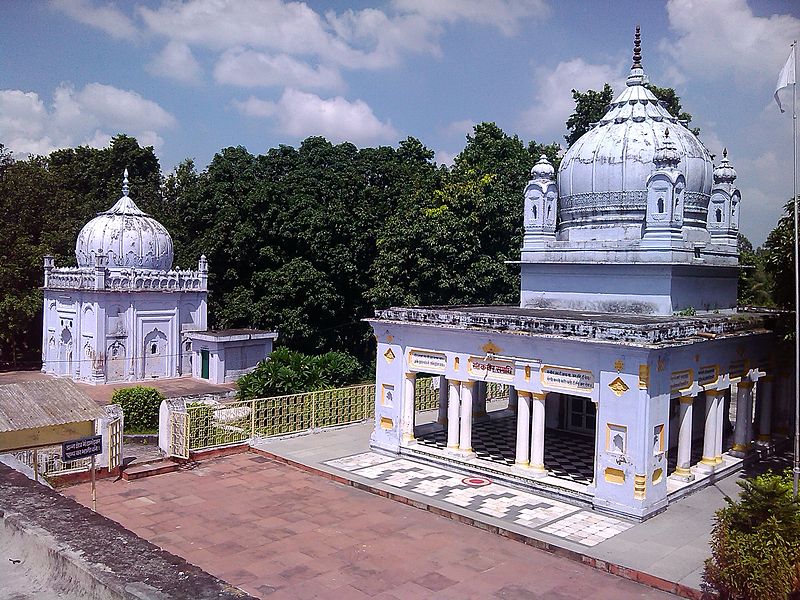
Kabir Chaura, the tomb of Kabir, Maghar, Uttar Pradesh.
Source: Wikimedia Commons
Couplets translation credit: ‘Kabir’ by Prabahkar Machwe.
 Government of Indiaa
Government of Indiaa

 Recognizing the ongoing need to position itself for the digital future, Indian Culture is an initiative by the Ministry of Culture. A platform that hosts data of cultural relevance from various repositories and institutions all over India.
Recognizing the ongoing need to position itself for the digital future, Indian Culture is an initiative by the Ministry of Culture. A platform that hosts data of cultural relevance from various repositories and institutions all over India.
